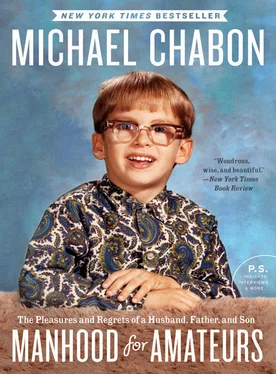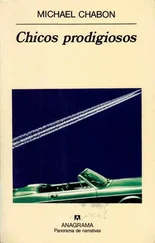Be honest, my wife and I had agreed.
“I have smoked it a number of times,” I told my son. “But I don’t do it anymore.”
This was true. Without ceremony or regret, I smoked marijuana for the last time in 2005—having not smoked any for at least a year before that — when I found myself, stoned out of my brain and very much not following the plot of Stephen Chow’s God of Cookery , unexpectedly called upon to engage in some urgent full-on parenting: There was an abortive sleepover and a necessary stretch of late-night driving to be done. Though I somehow managed to pull it off, gripping the wheel, heart pounding, the world beyond the windshield as trackless and unfathomable as any Jeff Beck guitar solo, I spent the next hour fighting off the knowledge that I was not up to the task, and I vowed that I would never risk putting my children or myself in that position again. On some fundamental level, I was no longer willing to endure, or capable of enjoying, that kind of fun.
“Why did you stop?” those children wanted to know. “Because it’s really illegal?”
“Well, it is really illegal,” I agreed. “In some ways, a lot more illegal than it used to be when I was younger. But that’s not really it. It has to do with, well, with being ready, you know. It’s just not something I’m ready to do anymore. And it’s not something you guys are ready to do, either. Right?”
“Right,” they said at once, with all the firmness and certainty I would have mustered myself in those years before I sailed off into the red light and velvet darkness.
“The truth is,” I told them, then pushed myself to live up to the principle my wife and I had established for contending not only with this issue but with all the other hypocrisies that life as a parent entails. I want to tell you / My head is filled with things to say , as George Harrison once sang, When you’re here / All those words, they seem to slip away . “The truth is that I’m confused about what to tell you,” I said. “But I mostly want us all to tell each other the truth.”
They said that sounded all right to them and that I shouldn’t worry. That’s just what I would have said at their age.

Almost every school day, at least one of my four children comes home with art: a drawing, a painting, a piece of handicraft, a construction-paper assemblage, an enigmatic apparatus made from pipe cleaners, sparkles, and clay. And almost every bit of it ends up in the trash. My wife and I have to remember to shove the things down deep, lest one of the kids stumble across the ruin of his or her laboriously stapled paper-plate-and-dried-bean maraca wedged in with the junk mail and the collapsed packaging from a twelve-pack of squeezable yogurt. But there is so much of the stuff; we don’t know what else to do with it. We don’t toss all of it. We keep the good stuff — or what strikes us, in the Zen of that instant between scraping out the lunch box and sorting the mail, as good. As worthier somehow: more vivid, more elaborate, more accurate, more sweated over. A crayon drawing that fills the entire sheet of newsprint from corner to corner, a lifelike smile on the bill of a penciled flamingo. We stack the good stuff in a big drawer, and when the drawer is finally full, we pull out the stuff and stick it in a plastic bin that we keep in the attic. We never revisit it. We never get the children’s artwork down and sort through it with them, the way we do with photo albums, and say “That’s how you used to draw curly hair” or “See how you made your letter E’s with seven crossbars?” I’m not sure why we’re saving it except that getting rid of it feels so awful.
Under the curatorship of my mother, my brother’s and my collected artwork is, if I may say so, a vastly more impoverished archive. From the years preceding high school there is almost nothing at all. The countless scenes of strafing Spitfires taking heavy German ack-ack fire, the corrugated-cardboard-and-foil George Washington hatchets, the clay menorahs (I never did make any dreidels out of clay), the works in crayon resist and papier-mâché and yarn and in media so mixed as to include Cheerios, autumn leaves, and dirt — gone, all of it. Do I care? Does it pain me to have lost forever this irrefutable evidence of my having been, if neither a prodigy nor an embryonic Matisse, a child? If my mother had held on to more of my childhood artwork, would I be happier now? Would the narrative that I have constructed of the nature and course of my childhood be more complete? I guess ultimately, I have no way of answering these questions. It’s like wondering whether sex would be more pleasurable if I had not been worked over by that old Jew with a knife at the age of eight days. How much more pleasurable, really, do I need it to be?
When I run across one of the pieces of artwork that my mother did save — paintings that I made in my junior and senior years of high school, for the most part — the prevailing emotion I experience, with breathtaking vividness, is the acute discontent that I felt at the time of their creation, a dissatisfaction purified of any residual sense of pride or accomplishment. Their flaws of perspective and construction, the places where I cheated or fudged or simply could not pull something off, even a faint tempera-scented whiff of the general miasma of mortification and insufficiency in which I then swam — they all present themselves to my sight and recollection with a force that makes me a little ill.
I’m not trying to excuse the act of throwing away my children’s artwork. The crookedest mark of a colored pencil on the back of a bank-deposit envelope, vaguely in the shape of a fish, is like a bright, stray trace of the boundless pleasure I take in watching my kids interact with the world. The set of processes joining their minds to their fingertips is a source of profound interest and endless speculation, a mystery that, through their artworks, my children endlessly expound. I know that if I live long enough, a time will come when their childhoods will strike me as having been mythically brief. Almost nothing will remain of these days, and they will be women and men, and I will look back on the lost piles of their drawings and paintings and sketches, the cubic yards of rubbings and scratchings consigned to the recycling bin, the reef’s worth of shells, sand, and coral glued to their découpage souvenirs of vacations in Hawaii and Maine, and rue my barbarism. I will be haunted by the memory of the way my younger daughter looks at me when she chances upon a crumpled sheet of paper in the recycling bin, bearing the picture, the very portrait, of five minutes stolen from the headlong rush of their hour in my care: She looks betrayed.
“I don’t know how that got in there,” I tell her. “That was clearly a mistake. What a great dog.”
“It’s a girl kung fu master.”
“Of course,” I say. When she isn’t looking, I throw it away again.
It’s not only her artwork that I’m busy throwing away. Almost every hour that I spend with my children is disposed of just as surely, tossed aside, burned through like money by a man on a spree. The sum total of my clear memories of them — of their unintended aphorisms, gnomic jokes, and the sad plain truths they have expressed about the world; of incidents of precociousness, Gothic madness, sleepwalking, mythomania, and vomiting; of the way light has struck their hair or eyelashes on vanished afternoons; of the stupefying tedium of games we have played on rainy Sundays; of highlights and horrors from their encyclopedic history of odorousness; of the 297,000 minor kvetchings and heartfelt pleas I have responded to over the past eleven years with fury, tenderness, utter lack of interest, or a heartless and automatic compassion — those memories, when combined with the sum total of photographs that we have managed to take, probably add up, for all four of my children, to under 1 percent of everything that we have undergone, lived through, and taken pleasure in together.
Читать дальше
Конец ознакомительного отрывка
Купить книгу













